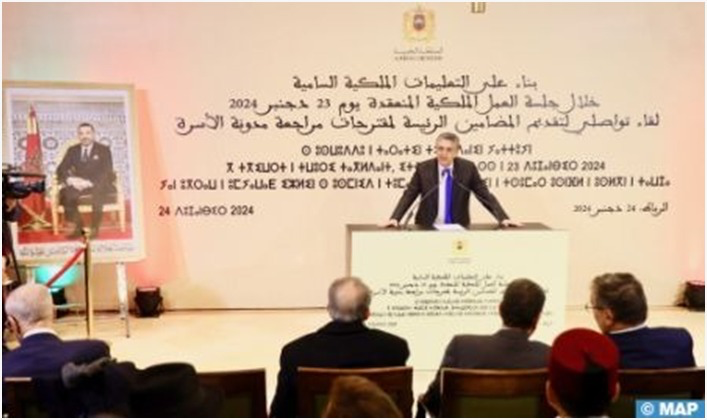Following the directives issued by King Mohammed VI during a working session at the Royal Palace in Casablanca, a communication meeting was held on Tuesday in Rabat to present key proposals for revising Morocco’s Family Code.
Transparency and Communication at the Forefront
Head of Government Aziz Akhannouch emphasized that the meeting was in line with the King’s instructions to keep public opinion informed about the substantial amendments proposed for the Family Code revision.
“His Majesty’s clear and insightful guidance aims to ensure that the revision meets the nation’s expectations,” Akhannouch noted, adding that the draft revision would be submitted to Parliament for adoption soon.
The meeting featured speeches by Justice Minister Abdellatif Ouahbi, Minister of Habous and Islamic Affairs Ahmed Toufiq, and Minister of Solidarity, Social Integration, and Family Naima Ben Yahia.
Proposals Rooted in Comprehensive Consultation
Minister Ouahbi detailed the extensive consultation process, which involved contributions from civil society, religious scholars, academics, and political actors. “The consultation aimed to address gaps in the current Family Code, adapt to societal dynamics, and align with international conventions ratified by Morocco,” Ouahbi explained.
The proposals, contained in a two-volume report, include 139 recommended amendments across seven sections of the Family Code. Key recommendations include:
• Marriage Documentation: Recognizing marriage certificates as primary proof of marriage, while permitting exceptions for certain cases.
• Rights for Moroccans Abroad: Allowing marriage registration without the presence of two Muslim witnesses in specific circumstances.
• Marriage Age: Setting the legal marriage age at 18 (Gregorian calendar), with exceptions for 17-year-olds under strict conditions.
• Polygamy: Requiring a wife’s explicit consent to polygamy, with strict legal conditions limiting its justification.
• Divorce: Introducing consensual divorce contracts without judicial intervention and setting a six-month resolution period for divorce and repudiation cases.
• Asset Management: Recognizing the economic contribution of a wife’s domestic work to marital assets.
• Child Custody: Treating child custody as a shared right during marriage and potentially extending this after separation.
• Inheritance: Adopting the Supreme Council of Ulemas’ recommendation for equitable asset distribution among heirs.
• Modernization: Updating obsolete legal terms and incorporating modern technologies, such as electronic notifications.
General Proposals Supporting the Reform
The proposals also suggest enhancing family justice through measures like:
• Establishing specialized training for family court judges and staff.
• Creating a one-stop shop for family law services.
• Raising awareness of marital rights and obligations.
• Developing a national registry for marriage and divorce certificates.
A Forward-Looking Revision
Minister Ouahbi highlighted that the reform seeks to balance Morocco’s cultural and religious heritage with its commitment to progress in human rights. “This profound revision respects the principles of justice, equality, and solidarity, ensuring the Family Code evolves with the times while maintaining its foundation in Sharia,” he said.
Participation and Ownership
King Mohammed VI’s vision for this reform emphasized inclusivity and constructive collaboration. The meeting reaffirmed the Kingdom’s commitment to gradual, consistent, and forward-looking reforms.
Attendance
The meeting was attended by prominent figures, including Rachid Talbi Alami, Speaker of the House of Representatives; Mohamed Ould Errachid, Speaker of the House of Councillors; Mohamed Abdennabaoui, President delegate of the Supreme Council of Judicial Power and El Hassan Daki, King’s Public Prosecutor at the Court of Cassation.
The revision aims to build on past achievements while addressing current gaps to create a Family Code that reflects the values of justice, equality, and the collective Moroccan identity.
Latest Stories
-
Album review: ‘Wonder’ by Nana Fredua-Agyeman Jnr
50 minutes -
Bouncy castle, sack race, and smiles galore: Joy FM Family Party takes over Aburi Gardens
52 minutes -
Watch: Kwan Pa Band thrills patrons at Joy FM Family Party in the Park
55 minutes -
Akufo-Addo partly to blame for NPP’s defeat in 2024 election – Frank Agyekum
60 minutes -
Rapid urbanisation endangers children’s mental health – Psychiatrist warns
1 hour -
Kedland International School hosts maiden Festival of Nine Lessons and Carols
1 hour -
I didn’t speak against holding wrongdoers accountable – Rev. Kwadwo Bempah clarifies ORAL comment
2 hours -
RSS Developers to hold 3-day open house event on home purchasing from Friday, Dec. 27
3 hours -
Elikem Treveh: How TEIN UMaT students contributed significantly to NDC’s victory in Tarkwa Nsuaem constituency
3 hours -
Joy FM Family Party in the Park kicks off with excitement at Aburi Botanical Gardens
3 hours -
Australian mining giant files $277m claim against Ghana over gold project dispute
3 hours -
JP U-15 Cup 2024: Fadama Ajax wins maiden edition
4 hours -
Lured for Love, Caged for Cash: How an 80-year-old American seeking love was kidnapped in Ghana by a Nigerian gang
4 hours -
Star Oil Ltd @ 25: Driving Growth and Profitability with a Vision for Renewable Energy and a Sustainable Future
5 hours -
American Airlines resumes flights after technical issue
6 hours

